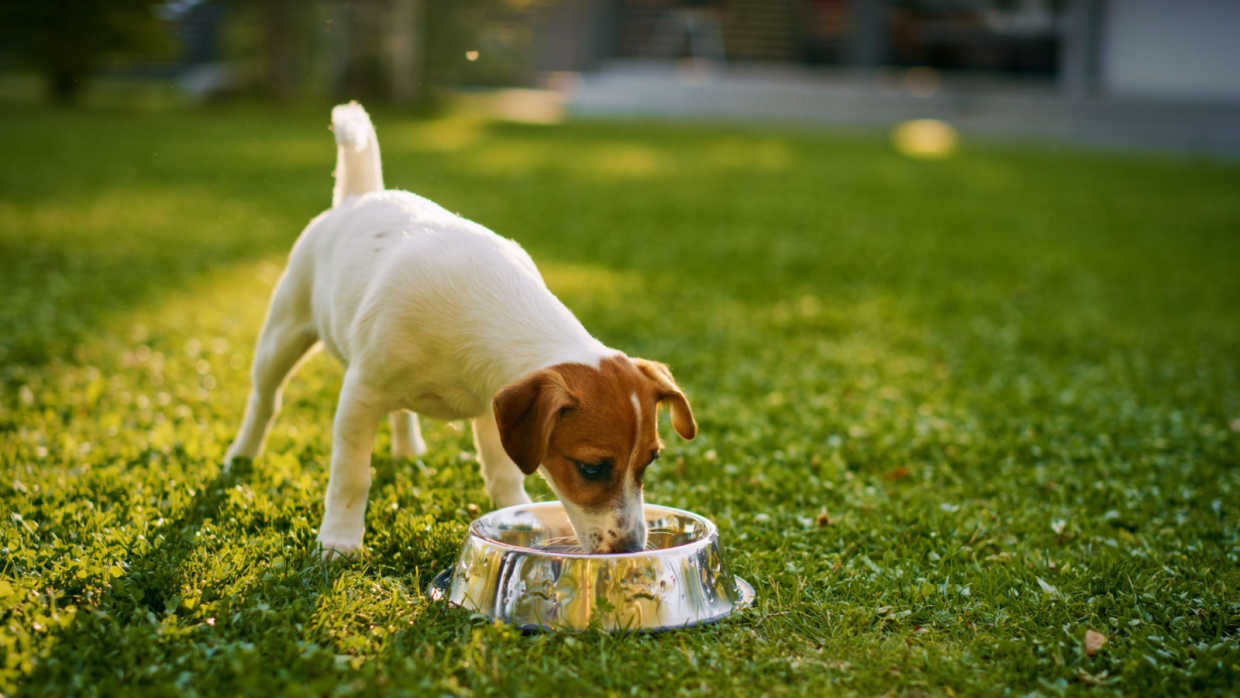Dehydration can have severe consequences for your dog’s health, from lethargy and weakness to kidney damage and hypovolemic shock. But how much does your pup really need? The amount of water your dog needs to stay healthy can vary based on their age, activity level and health status. Explore how to take care of your dog and keep them happy, healthy and sufficiently hydrated.
Factors Influencing Water Consumption
As a dog parent, it is essential to understand what influences your dog’s water consumption and how to keep them hydrated.
-
Breed and size differences: Generally speaking, dogs need one ounce of water per pound of body weight daily. So, larger breeds need more water than smaller breeds.
-
Age: Very young puppies fulfill their hydration needs from their mother’s milk. But as they transition to solid food, they need a fresh water supply. Older puppies require between ½ ounce and 1 ounce of water per pound of body weight daily. For example, a 20-pound puppy would need between 10 and 20 ounces daily, with a higher intake on active days.
-
Activity levels and exercise routines: Dogs with active lifestyles or intense exercise routines need more water than the standard daily recommendation. Physical activity leads to increased water loss through panting and sweating.
-
Climate and environmental conditions: In hot and humid weather, dogs drink more to cool down. Dogs in drier climates may need more water to compensate for environmental moisture loss.
-
Health status and medical conditions: A healthy dog typically only needs the recommended amount of water daily, but a dog with health issues like diabetes or kidney disease may require a different regimen.
For example, kidney disease often manifests as increased urination in your pup, leading to a natural increase in thirst and water intake. Diabetes in dogs is also frequently characterized by excessive thirst, resulting in increased water consumption. Dog owners need to be aware of these signs and maintain regular veterinary check-ups, especially as their dogs age or deviate from their normal behavior.
Diet and type of food consumed. The type of food a dog eats affects its water intake. Dogs on dry kibble usually need more water than those on diets with higher moisture content, like wet or gently cooked food. Wet food diets can contain up to 65-80% water.
How Much Water Should I Give My Dog?
Adult dogs should consume about one ounce of water or ⅛ of a cup per pound of body weight each day. This rule is more of a guideline and you should not restrict your dog’s water intake.
For example, a 100-pound adult dog like a Rottweiler or a Newfoundland should consume around 100 ounces of water throughout the day. However, a toy breed like the Miniature Pinscher or Maltese, which only reaches about 10 pounds, would only need around 10 ounces of water daily.
Tips for Improving Your Dog’s Hydration
Keeping your pup’s water bowl full and in an easily accessible place is the best way to ensure your dog stays hydrated. But occasionally, dogs will refuse their water bowl, leading to dehydration.
The following practical tips, from implementing dietary enhancements to simple daily habits, can help keep your dog’s water intake on track.
-
Keep multiple water stations at home: Having several water stations around your home, especially in places where your pup likes to hang out in the house, encourages them to drink more frequently.
-
Clean water bowls daily: Many dogs will avoid their water bowl if it is dirty, preventing them from getting the hydration they need. Scrub the bowls daily with soap and water to prevent bacterial growth and ensure your dog drinks clean water.
-
Carry a portable water bowl: When on the go, carry a portable water bowl. This ensures your dog can stay hydrated during walks, hikes or road trips.
-
Watch for signs of dehydration: Test your dog’s hydration by gently pulling the skin on the back of their neck - it should snap back quickly if they are well-hydrated. Also, check their gums; they should be moist, not dry or sticky. If you notice signs of dehydration, practice these tips and consult a vet if nothing improves.
Keep Your Dog Healthy and Hydrated
While it’s important to consider how much water your dog drinks, you also need to think about the role your pet’s food plays in their overall hydration and nutrition. At Open Farms, we offer a range of products crafted with the best ingredients in dog food, that support your dog’s well-being.
Browse Open Farm’s full range of wet foods, gently cooked recipes and bone broth today to find the perfect fit for your pup’s dietary needs.
